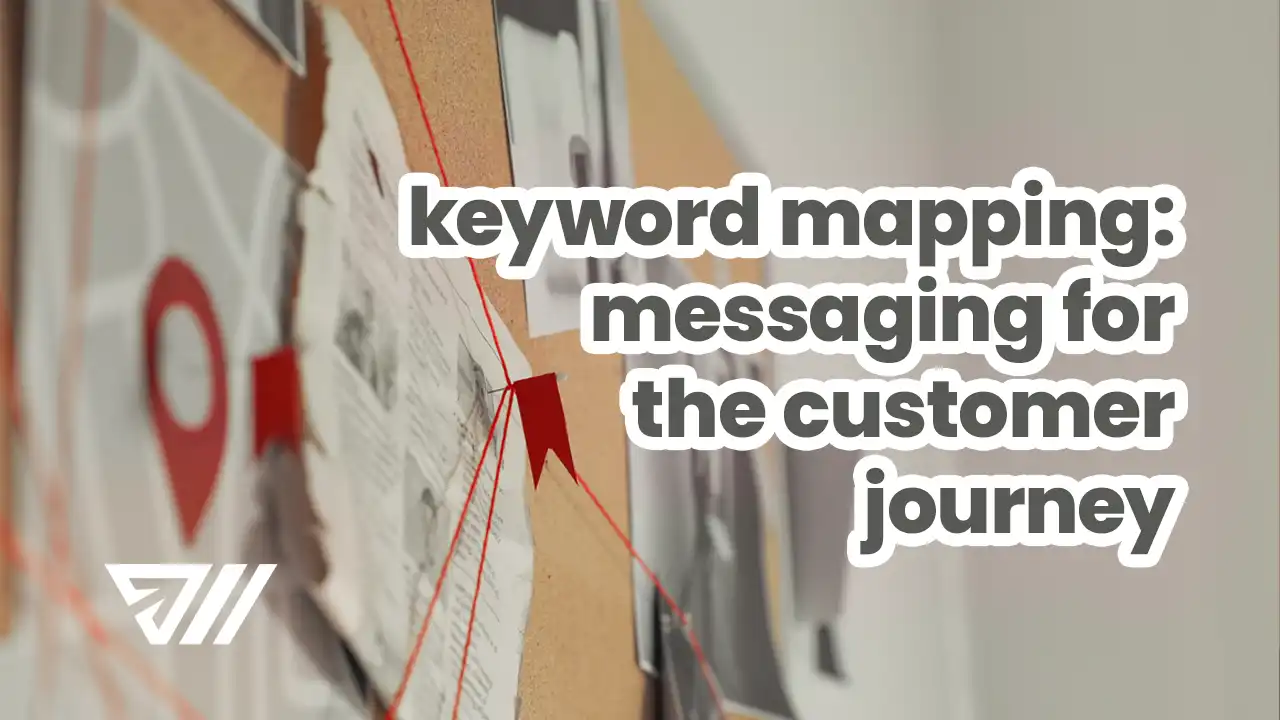Keywords For Marketing: Robust Research For Client Success
One of the biggest mistakes you can make in branding and marketing is to assume that keyword research only matters for SEO. Agencies frequently shoehorn keywords into their strategy when working on website content, but this is too late. Keyword positioning needs to be done as soon as you have an ideal customer profile. You need this information before you work on strategy and messaging.
Keyword positioning plans are beneficial because they tell us an ideal client's search intent. You get to see what they think when looking for the solution to their problem. And the keywords customers have in mind don't change. They could be searching Google, driving past a billboard, flipping past an ad in a magazine - or searching YouTube, TikTok, Instagram, and LinkedIn. Those keywords will resonate and should be utilized across your marketing and branding messages.

Introduction to Keyword Research in Digital Marketing
At its core, keyword research identifies the terms and phrases people enter into search engines. These keywords connect user search intent with your content, products, and services. Mastering keyword research allows you to craft strategies that align perfectly with the audience's needs, enhancing the visibility and relevance of the brand's online presence.
Keywords Defined
Keywords are the starting point of search engine optimization (SEO) and pay-per-click (PPC) advertising campaigns. They help define the content strategy, guide the creation of blogs, articles, and website copy, and optimize metadata.
Even though keywords come from search engine optimization, they are essential because search and pay-per-click data is the most robust and historically deep information we have on customers.
The Strategic Importance of Keyword Research
Keyword research is more than a foundational step in SEO and PPC campaigns. It informs the entire brand messaging. A good keyword positioning plan provides insights into consumer behavior, market dynamics, and competitive positioning. This process goes beyond merely identifying terms with high search volumes; it's about understanding what drives a user to search and how that knowledge can shape content and business strategies.
Deciphering the Layers of Search Intent
Each search query is a glimpse into the user's current needs, desires, or problems. Branding and marketing agencies must become adept at interpreting these needs. Are customers seeking information ("What is...?"), attempting to locate a specific website or page ("Homepage of..."), or ready to make a purchase ("Buy... online"). This knowledge is crucial for developing content that speaks directly to the user's stage in the buyer's journey.
Strategic Content Alignment
Aligning client content with search intent ensures that prospects find what they're looking for, which significantly boosts the chances of engagement and conversion. This strategy transforms a client's website into a valuable resource that users trust and return to, fostering loyalty and enhancing brand reputation. More importantly, it allows you to resonate with ideal customer needs across the brand's social media, email, ads, and direct mail campaigns.

Data-Driven Content Development
The insights from keyword research highlight the topics and questions most relevant to the target audience. This data-driven approach ensures that content is appropriate, engaging, and aligned with the audience's evolving interests and needs. Marketers can craft a content strategy that captures attention and drives traffic by focusing on what users are actively searching for.
Strategic Business Insights
Beyond content creation, keyword research can unveil market trends and consumer preferences that inform broader business strategies. For example, a surge in searches for sustainable products could prompt a company to highlight its eco-friendly practices or develop a new line of green products. Similarly, discovering a high volume of searches from a specific geographic area might suggest expanding operations or focusing marketing efforts in that region.
Competitive Analysis and Market Positioning
Keyword research also offers a lens through which to view the competitive landscape. Often, the businesses that a client perceives as their main competitors are inaccurate - based on anecdotal experience. A good keyword positioning plan will show you - at least from a search results perspective - exactly who those competitors are. And it will show that on a keyword-by-keyword basis. You'll better understand how the outside world perceives who the winners in your industry are.
Understanding the keywords competitors rank for reveals their strengths and highlights opportunities to differentiate. By identifying gaps in their content or areas they haven't fully addressed, a business can carve out a unique niche or position itself as a leader in underserved aspects of the market.
Driving Strategic Business Decisions
The aggregated data from keyword research can lead to pivotal business decisions. Insights into consumer behavior and market demands can inspire the development of new products or services, the refinement of existing offerings, or even the company's rebranding to better align with market trends. This strategic approach will keep the brand agile and responsive to the market, always ready to seize opportunities for growth and innovation.
Executing Effective Keyword Research
Keyword research combines analytical rigor with creative insight to discover the terms that resonate with an audience. We look at all the data points holistically to get an accurate picture of what is best for the specific brand. We then map the appropriate keywords to the brand's products or services - those become the pillar keywords. We then create a hierarchy of supporting keywords for those pillar topics, which become cluster content like blogs, guest posts, and short-form content. The brand walks away knowing the exact messaging to put into its marketing campaigns and content calendar for the next year or more.
Keyword Research Tools
Beyond Semrush, Ahrefs, and Google Keyword Planner, marketers can leverage tools like Moz, Ubersuggest, and Keyword Tool.io. Each tool offers unique functionalities, from uncovering keyword ideas based on actual search queries to analyzing the competitive landscape of specific keywords. Effectively using these tools involves a mix of broad exploratory searches and deep dives into particular terms or niches.
Effective keyword research also involves integrating search data with broader consumer insights. This might include social media sentiment analysis, customer feedback channels, and market research studies to ensure that the keywords align with what people are searching for and their broader behaviors and preferences. Services like Sparktoro can help provide broad clickstream data highlighting keyword trends and affinity with various websites and social media accounts.
Leveraging analytics tools provides:
- Insights beyond mere performance metrics.
- Offering clues about audience needs.
- Content gaps.
- Emerging trends.

Keyword Mapping and Strategy Development
Once you have a comprehensive list of keywords, the next step involves mapping these keywords to specific content pieces, landing pages, and stages of the buyer's journey. A keyword positioning plan provides a roadmap for aligning keywords with content development. Each piece of content serves a targeted purpose, guiding users through a coherent and compelling narrative that leads to better brand engagement and conversion. No more guessing at what will connect with customers. You can take a targeted approach and avoid wasting resources on content that won't benefit the brand.
Strategic Application of Short vs. Long-Tail Keywords
While short keywords capture broad interest, integrating long-tail keywords into content and campaigns targets users further down the funnel, closer to the conversion point. The strategic use of both types can maximize visibility and attract a diverse audience, from those at the initial stages of awareness to those ready to purchase.
The Role of Branded, Non-Branded, and Niche Keywords
Branded Keywords are crucial for capturing users with existing brand awareness, ensuring they find the right pages or products when they're looking specifically for what a business offers.
Non-branded keywords widen the net, drawing in users in the market for a product or service but may not have a specific provider in mind. These keywords are vital for top-of-funnel content, helping introduce new brand audiences.
Niche Keywords allow for targeted marketing efforts, reaching into specific interests or needs of a segment of the market that may be underserved. By focusing on these keywords, businesses can position themselves as leaders or specialists in particular areas, creating dedicated followings and capturing highly motivated market segments.

Building Authority in Niche Markets
Establishing a brand as a leader in a niche market involves identifying underserved or particular segments within broader categories. This requires thorough market research to uncover unique needs, interests, and keywords that need to be fully addressed by competitors. Content tailored to these niche keywords positions the brand as a knowledgeable and authoritative source, attracting a dedicated and highly engaged audience.
Leveraging Long-Tail Keywords for Niche Targeting
Long-tail keywords are more specific regarding pain points, features, and results. While that means they will have lower overall traffic, those visits will be more valuable to the brand. Long-tail keywords are often less competitive and easier to rank for, making them ideal for targeting niche segments. Crafting content around long-tail keywords allows you to address particular interests, problems, or queries, delivering highly personalized and relevant content to niche audiences.
Measuring and Adapting to Niche Market Dynamics
The effectiveness of targeting local and niche markets with tailored keyword strategies must be continually monitored and adapted. This involves analyzing performance metrics, gathering audience feedback, and staying attuned to changes in market trends or search behaviors. The agility to adapt keyword strategies in response to these insights ensures sustained relevance and engagement.
The Importance of Relevance and Specificity
Keywords guide users to the most relevant content. This precision ensures that the prospects driven to the page by these keywords are highly targeted and likely to engage with the content, leading to higher conversion rates. Aligning keywords with user intent isn't just about attracting traffic; it's about fulfilling the user's search objectives. Keywords should be selected and implemented to mirror the user's journey, enhancing the overall user experience and fostering positive brand interactions.
Contact us today to get started with your keyword positioning plan.
Let's Talk!
Websuasion combines data analytics, cutting-edge tech, and expert teams. "Data. Tech. Team." Those are the words we live by at websuasion. Our services foster growth and scalability for your business - all while maintaining your brand. We are an indispensable ally for you as you navigate online marketing. Let's talk. We'd love to know more about what you do and how we can solve your pain points.
By providing a telephone number, opting in to SMS Text Messaging, and submitting this form you are consenting to be contacted by SMS text message. Message & data rates may apply. You can reply STOP to opt-out of further messaging.








